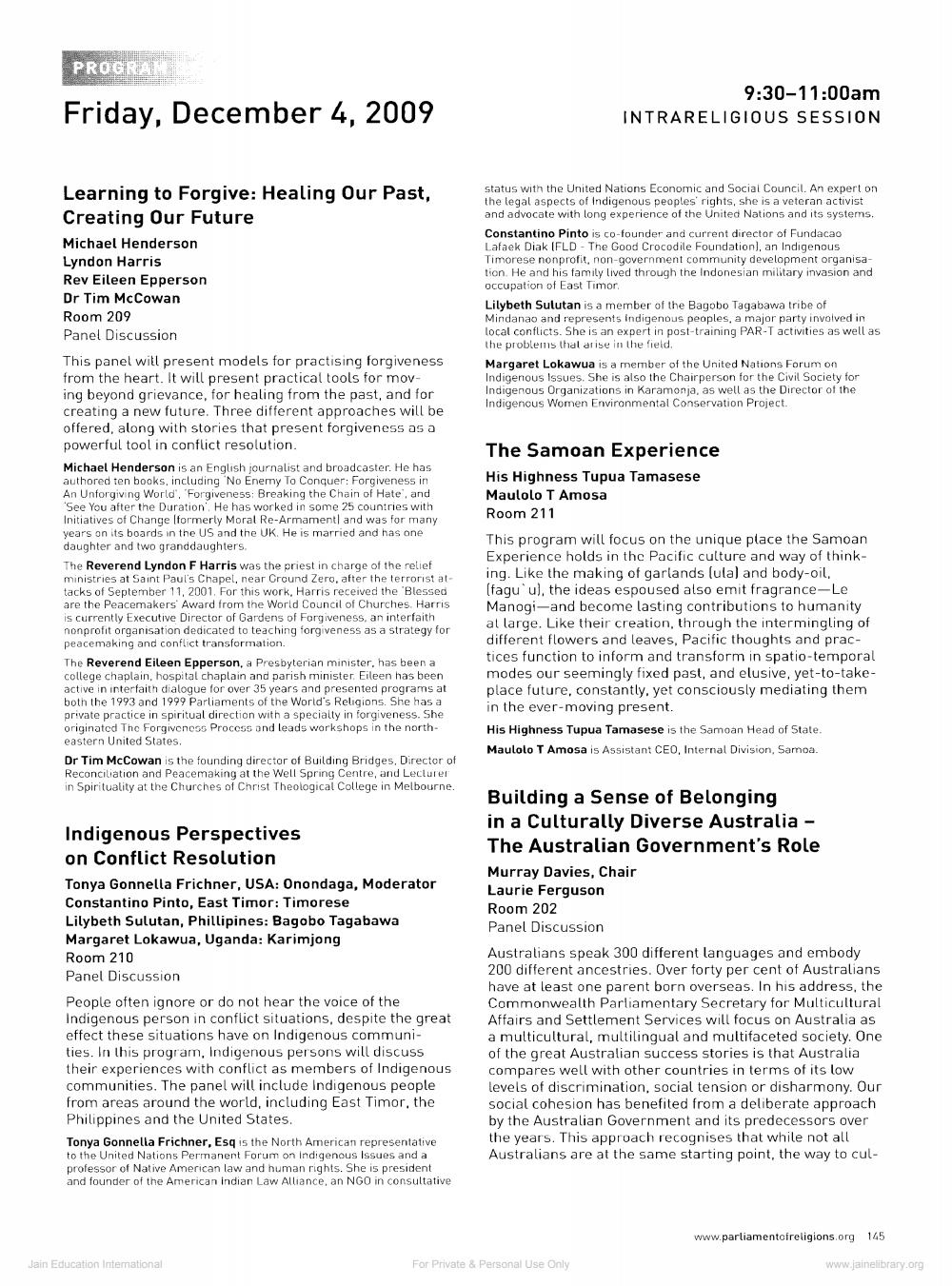________________
PROGRAM
Friday, December 4, 2009
Learning to Forgive: Healing Our Past, Creating Our Future
Michael Henderson Lyndon Harris
Rev Eileen Epperson Dr Tim McCowan Room 209 Panel Discussion
This panel will present models for practising forgiveness from the heart. It will present practical tools for moving beyond grievance, for healing from the past, and for creating a new future. Three different approaches will be offered, along with stories that present forgiveness as a powerful tool in conflict resolution.
Michael Henderson is an English journalist and broadcaster. He has authored ten books, including No Enemy To Conquer: Forgiveness in An Unforgiving World', 'Forgiveness: Breaking the Chain of Hate, and See You after the Duration. He has worked in some 25 countries with Initiatives of Change (formerly Moral Re-Armament) and was for many years on its boards in the US and the UK. He is married and has one daughter and two granddaughters.
The Reverend Lyndon F Harris was the priest in charge of the relief ministries at Saint Paul's Chapel, near Cround Zero, after the terrorist attacks of September 11, 2001. For this work, Harris received the 'Blessed are the Peacemakers' Award from the World Council of Churches. Harris is currently Executive Director of Gardens of Forgiveness, an interfaith nonprofit organisation dedicated to teaching forgiveness as a strategy for peacemaking and conflict transformation.
The Reverend Eileen Epperson, a Presbyterian minister, has been a college chaplain, hospital chaplain and parish minister. Eileen has been active in interfaith dialogue for over 35 years and presented programs at both the 1993 and 1999 Parliaments of the World's Religions. She has a private practice in spiritual direction with a specialty in forgiveness. She originated The Forgiveness Process and leads workshops in the northeastern United States.
Dr Tim McCowan is the founding director of Building Bridges, Director of Reconciliation and Peacemaking at the Well Spring Centre, and Lecturer in Spirituality at the Churches of Christ Theological College in Melbourne.
Indigenous Perspectives
on Conflict Resolution
Tonya Gonnella Frichner, USA: Onondaga, Moderator Constantino Pinto, East Timor: Timorese Lilybeth Sulutan, Phillipines: Bagobo Tagabawa Margaret Lokawua, Uganda: Karimjong Room 210
Panel Discussion
People often ignore or do not hear the voice of the Indigenous person in conflict situations, despite the great effect these situations have on Indigenous communities. In this program, Indigenous persons will discuss their experiences with conflict as members of Indigenous communities. The panel will include Indigenous people from areas around the world, including East Timor, the Philippines and the United States.
Tonya Gonnella Frichner, Esq is the North American representative to the United Nations Permanent Forum on Indigenous Issues and a professor of Native American law and human rights. She is president and founder of the American indian Law Alliance, an NGO in consultative
Jain Education International
9:30-11:00am INTRARELIGIOUS SESSION
status with the United Nations Economic and Social Council. An expert on the legal aspects of Indigenous peoples' rights, she is a veteran activist and advocate with long experience of the United Nations and its systems. Constantino Pinto is co-founder and current director of Fundacao Lafaek Diak (FLD The Good Crocodile Foundation), an Indigenous Timorese nonprofit, non-government community development organisation. He and his family lived through the Indonesian military invasion and occupation of East Timor.
Lilybeth Sulutan is a member of the Bagobo Tagabawa tribe of Mindanao and represents Indigenous peoples, a major party involved in local conflicts. She is an expert in post-training PAR-T activities as well as the problems that arise in the field.
Margaret Lokawua is a member of the United Nations Forum on Indigenous Issues. She is also the Chairperson for the Civil Society for Indigenous Organizations in Karamonja, as well as the Director of the Indigenous Women Environmental Conservation Project.
The Samoan Experience
His Highness Tupua Tamasese Maulolo T Amosa
Room 211
This program will focus on the unique place the Samoan Experience holds in the Pacific culture and way of thinking. Like the making of garlands (ula) and body-oil, [fagu u), the ideas espoused also emit fragrance-Le Manogi-and become lasting contributions to humanity at large. Like their creation, through the intermingling of different flowers and leaves, Pacific thoughts and practices function to inform and transform in spatio-temporal modes our seemingly fixed past, and elusive, yet-to-takeplace future, constantly, yet consciously mediating them in the ever-moving present.
His Highness Tupua Tamasese is the Samoan Head of State. Maulolo T Amosa is Assistant CEO, Internal Division, Samoa.
Building a Sense of Belonging
in a Culturally Diverse Australia - The Australian Government's Role Murray Davies, Chair
Laurie Ferguson Room 202
Panel Discussion
Australians speak 300 different languages and embody 200 different ancestries. Over forty per cent of Australians have at least one parent born overseas. In his address, the Commonwealth Parliamentary Secretary for Multicultural Affairs and Settlement Services will focus on Australia as a multicultural, multilingual and multifaceted society. One of the great Australian success stories is that Australia compares well with other countries in terms of its low levels of discrimination, social tension or disharmony. Our social cohesion has benefited from a deliberate approach by the Australian Government and its predecessors over the years. This approach recognises that while not all Australians are at the same starting point, the way to cul
For Private & Personal Use Only
www.parliamentofreligions.org 145
www.jainelibrary.org




